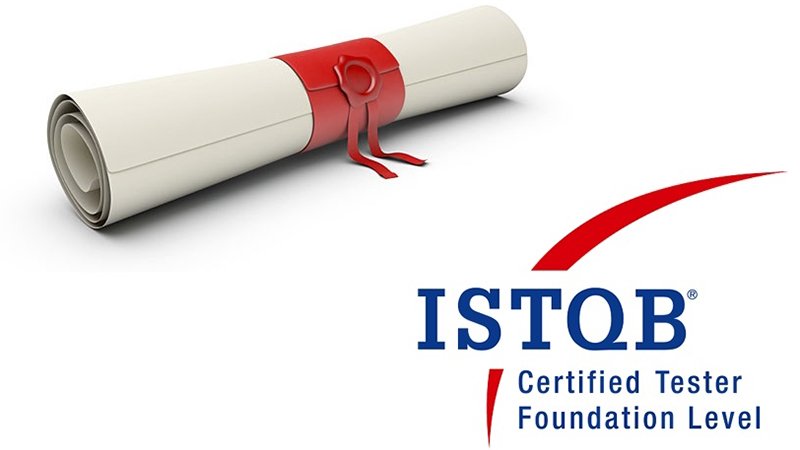
FREE
Course Summary
The International Software Testing Qualifications Board known as ISTQB is an accredited certification organization. ISTQB is specialized and offers many types of internationally accepted Software Testing Certification. ISTQB exams are conducted online or through an Exam Provider location. Candidates who pass the exam are given the ISTQB Certified Tester certificate.
If you are a software tester or looking for your first software testing job, getting your ISTQB Certified Tester Foundation Level (CTFL) Certification is an advantage. Many employers expect their testers to have ISTQB Foundation Level Certification. It helps software testers to be more effective and efficient in the software testing profession.
Course Topic:
1) The Fundamentals of testing: (K2)
- Why is testing necessary? (K2)
- What is Testing? (K2)
- Testing Principles (K2)
- Fundamental Test Process (K1)
- The psychology of Testing (K2)
- Chapter 1 sample exam questions
2) Testing throughout the life-cycle: (K2)
- Software development models (K2)
- Test Levels (K2)
- Test types (K2)
- Maintenance testing (K2)
- Code of Ethics
- Chapter 2 sample exam questions
3) Static testing: (K2)
- Reviews and the Test process (K2)
- Review Process (K2)
- Static analysis by tools (K2)
- Chapter 3 sample exam questions
4) Test design techniques: (K4)
- Identifying test conditions and designing test cases (K2)
- Categories of test design techniques (K2)
- Specification based or Black Box techniques (K3)
- Structure based or white Box techniques (K4)
- Experienced based techniques (K2)
- Choosing a Test techniques (K2)
- Chapter 4 sample exam questions
5) Test Management: (K3)
- Test organization (K2)
- Test Plans, estimates and strategies (K3)
- Test progress, monitoring and control (K2)
- Configuration management (K2)
- Risk and testing (K2)
- Incident management (K3)
- Chapter 5 sample exam questions
6) Tool support for testing: (K2)
- Types of test tools (K2)
- Effective use of tools (K2)
- Introducing a tool into an organization (K1)
- Chapter 6 sample exam questions
7) Sample Exam Questions Only
8) Sample Exam Questions + Answers
What are the prerequisites?
- There is no formal prerequisite for this course.
What am I going to get from this course?
- CTFL helps software testers to be more effective and efficient in the software testing profession. Also, holders of the Foundation Level Certificate are eligible to continue on to higher level software testing qualification certifications.
Who are the target audience?
- Anyone interested to learn more about Software Testing and ISTQB CTFL Certification.
Curriculum
Introduction
Introduction
Course Overview
1. Fundamentals of Testing
Why is testing necessary? -Software Systems Context (K1)
Why is testing necessary? -Causes of Software Defects (K2)
Role of Testing in Software Development, Maintenance and Operations (K2) - Testing and Quality (K2) - How Much Testing is Enough? (K2)
What is Testing? (K2)
Seven Testing Principles (K2)
Fundamental Test Process (K1)
The psychology of Testing (K2)
Code of Ethics
2. Testing Throughout the Software Life Cycle
Software Development Models (K2)
Test Levels (K2)
Test Types and Maintenance Testing (K2)
3. Static Techniques
3.1 Static Techniques and the Test Process (K2)
3.2 Review Process - Activities of a Formal Review (K1)
3.2 Review Process - Roles and Responsibilities (K1)
3.2 Review Process - Types of Reviews (K2)
3.2 Review Process - Success Factors for Reviews (K2)
3.3 Static Analysis by Tools (K2)
4. Test Design Techniques
4.1 The Test Development Process (K3)
4.2 Categories of Test Design Techniques (K2)
4.3 Specification-based or Black- box Techniques (K3)
4.4 Structure-based or White-box Techniques (K4)
4.5 Experience-based Techniques (K2)
4.6 Choosing Test Techniques (K2)
5. Test Management
5.1 Test Organization- Test Organization and Independence (K2)
5.1 Test Organization- Tasks of the Test Leader and Tester (K1)
5.2 Test Planning and Estimation- Test Planning Activities (K3)
5.2 Test Planning and Estimation- Test Estimation, Test Strategy & Test Approach (K2)
5.3 Test Progress Monitoring and Control (K2)
5.4 Configuration Management (K2)
5.5 Risk and Testing - Project Risks (K2)
5.5 Risk and Testing - Product Risks (K2)
5.6 Incident Management (K3)
6. Tool Support for Testing
6.1 Types of Test Tools- Tool Support for Testing (K2)
6.1 Types of Test Tools- Test Tool Classification (K2 )
6.2 Effective Us e of Tools -Potential Benefits and Risks of Tool Support f or Testing (for all tools) (K2)
6.2 Effective Us e of Tools - Special Considerations for Some Types of Tools (K1)
6.3 Introducing a Tool into an Organization (K1)
Sample Exam Questions Only
ISTQB Sample Exam
ASTQB Sample Exam
ASTQB Sample Exam Answers only
Sample Exam Questions + Answers
ISTQB Sample Exam Questions+Answers
ASTQB Sample Exam Questions+Answers
Sample Exam#3 Questions+Answers
Sample Exam#4 Questions+Answers
Facilitators

Luthfur Khan
Confirmation
Are you sure to enroll for the course ?
ISTQB Certification - Foundation Level (CTFL) - FREE
By clicking "CONFIRM" you agree to the Terms and Conditions.








